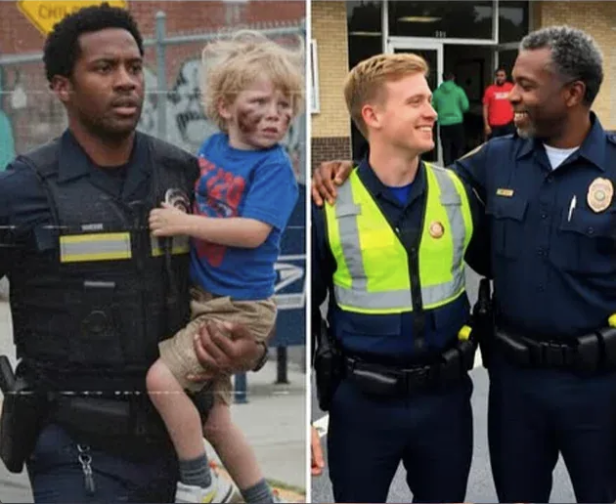
I was 5 when our kitchen caught fire. My parents didn’t make it out. Firefighter James Miller found me hiding under the table, wrapped me in his jacket, and said, “You’re safe now, buddy.”
He wasn’t ready to be a dad, but he couldn’t walk away. He said he’d check on me for a few days—those days turned into forever.
He taught me to ride a bike, shake hands, and show up when people need help. Now we work side by side in the same precinct—the man who saved me and the son who followed his steps.
Five years old. An age when most children’s biggest worries are which toy to play with or what’s for dinner. This child’s kitchen caught fire. His parents didn’t make it out. In moments, he went from having a family to being an orphan, from a normal evening to hiding under a table while smoke filled the house and flames consumed everything familiar.
Firefighter James Miller found him hiding under the table. Imagine that scene—smoke thick enough to obscure vision, heat intense enough to threaten structural collapse, and somewhere in that chaos, a small child hiding in the only spot that felt safe. Miller could have grabbed him quickly and moved on to other rescue priorities. But he didn’t.
He wrapped the child in his jacket. Not just carrying him out, but wrapping him—providing warmth, comfort, protection. Making the child feel safe before moving him. Then he said something the boy would remember for the rest of his life: “You’re safe now, buddy.”
In that moment, Miller gave more than rescue. He gave reassurance. Used a term of endearment—”buddy”—that made a terrified orphan feel like someone cared. Spoke calmly despite the emergency around them. Created a moment of safety in the middle of catastrophe.
“He wasn’t ready to be a dad, but he couldn’t walk away.” That sentence captures everything. Miller was probably young, single, focused on his firefighting career. Taking on a traumatized 5-year-old orphan wasn’t his plan. But after rescuing this child, after looking into those eyes and saying “you’re safe now,” he couldn’t just hand him off to the system and forget about him.
“He said he’d check on me for a few days—those days turned into forever.” Miller probably told himself he’d just make sure the kid was okay. Visit the foster home or group facility, bring a toy, reassure himself that the child he’d rescued was adjusting. But days became weeks, weeks became months, and somewhere in that process, Miller realized he wasn’t just checking on this kid—he was becoming his dad.
“He taught me to ride a bike, shake hands, and show up when people need help.” Not just the basics of parenting, but lessons in character. Riding a bike represents childhood milestones, patient teaching, celebrating small victories. Shaking hands represents teaching respect, proper behavior, how to present yourself. Showing up when people need help represents the value Miller lived—that when someone’s in crisis, you respond, you don’t walk away.
“Now we work side by side in the same precinct.” The rescued child grew up and became a first responder himself. Not surprising—he was raised by a firefighter who modeled service, courage, and compassion. But there’s poetry in them working together. The man who saved his life and the son who followed those steps, now serving the same community.
The photos show this journey. First image: Miller carrying young boy from the fire, the child covered in soot, clutching Miller, looking traumatized. Second image: both of them in first responder uniforms, standing together as colleagues and family, the boy now a man wearing a vest that identifies him as working in the same precinct.
“The man who saved me and the son who followed his steps.” That’s not just about career choice. It’s about becoming the kind of man Miller modeled—someone who shows up in crisis, who doesn’t walk away when walking away would be easier, who wraps scared children in jackets and promises safety.
This story challenges adoption narratives that focus only on altruism. Miller didn’t adopt this child because he always wanted to be a dad or because he was looking to complete his family. He adopted because after rescuing him, he couldn’t walk away. Sometimes the most profound bonds form not from planning but from refusal to abandon someone who needs you.
It also reminds us that first responders’ impact extends beyond immediate rescue. Miller saved this child’s physical life that night. But by becoming his father, he saved his entire future—giving him family, stability, love, and a model of manhood worth following.
The kitchen fire took the boy’s biological parents. But Firefighter James Miller gave him a father who taught him to ride bikes, shake hands, and show up when people need help. Who said “you’re safe now, buddy” and spent the rest of his life making sure that remained true.